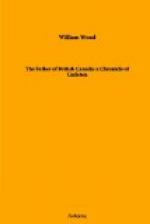Naturally enough, there was great satisfaction among the seigneurs and the clergy, with a general feeling among government supporters, both in England and Canada, that the best solution of a very refractory problem had been found at last. On the other hand, the Opposition in England, nearly every one in the American colonies, and the great majority of English-speaking people in Newfoundland, the Maritime Provinces, and Canada itself were dead against the Act; while the habitants, resenting the privileges already reaffirmed in favour of the seigneurs and clergy, and suspicious of further changes in the same unwelcome direction, were neutral at the best and hostile at the worst.
The American colonists would have been angered in any case. But when they saw Canada proper made as unlike a ‘fourteenth colony’ as could be, and when they also saw the gates of the coveted western lands closed against them by the same detested Act—the last of the ’five intolerable acts’ to which they most objected—their fury knew no bounds. They cursed the king, the pope, and the French Canadians with as much violence as any temporal or spiritual rulers had ever cursed heretics and rebels. The ‘infamous and tyrannical ministry’ in England was accused of ‘contemptible subservience’ to the ’bloodthirsty, idolatrous, and hypocritical creed’ of the French Canadians. To think that people whose religion had spread ’murder, persecution, and revolt throughout the world’ were to be entrenched along the St Lawrence was bad enough. But to see Crown protection given to the Indian lands which the Americans considered their own western ‘birthright’ was infinitely worse. Was the king of England to steal the valley of the Mississippi in the same way as the king of France?
It is easy to be wise after the event and hard to follow any counsel of perfection. But it must always be a subject of keen, if unavailing, regret that the French Canadians were not guaranteed their own way of life, within the limits of the modern province of Quebec, immediately after the capitulation of Montreal in 1760. They would then have entered the British Empire, as a whole people, on terms which they must all have understood to be exceedingly generous from any conquering power, and which they would have soon found out to be far better than anything they had experienced under the government of France. In return for such unexampled generosity they might have become convinced defenders of the only flag in the world under which they could possibly live as French




